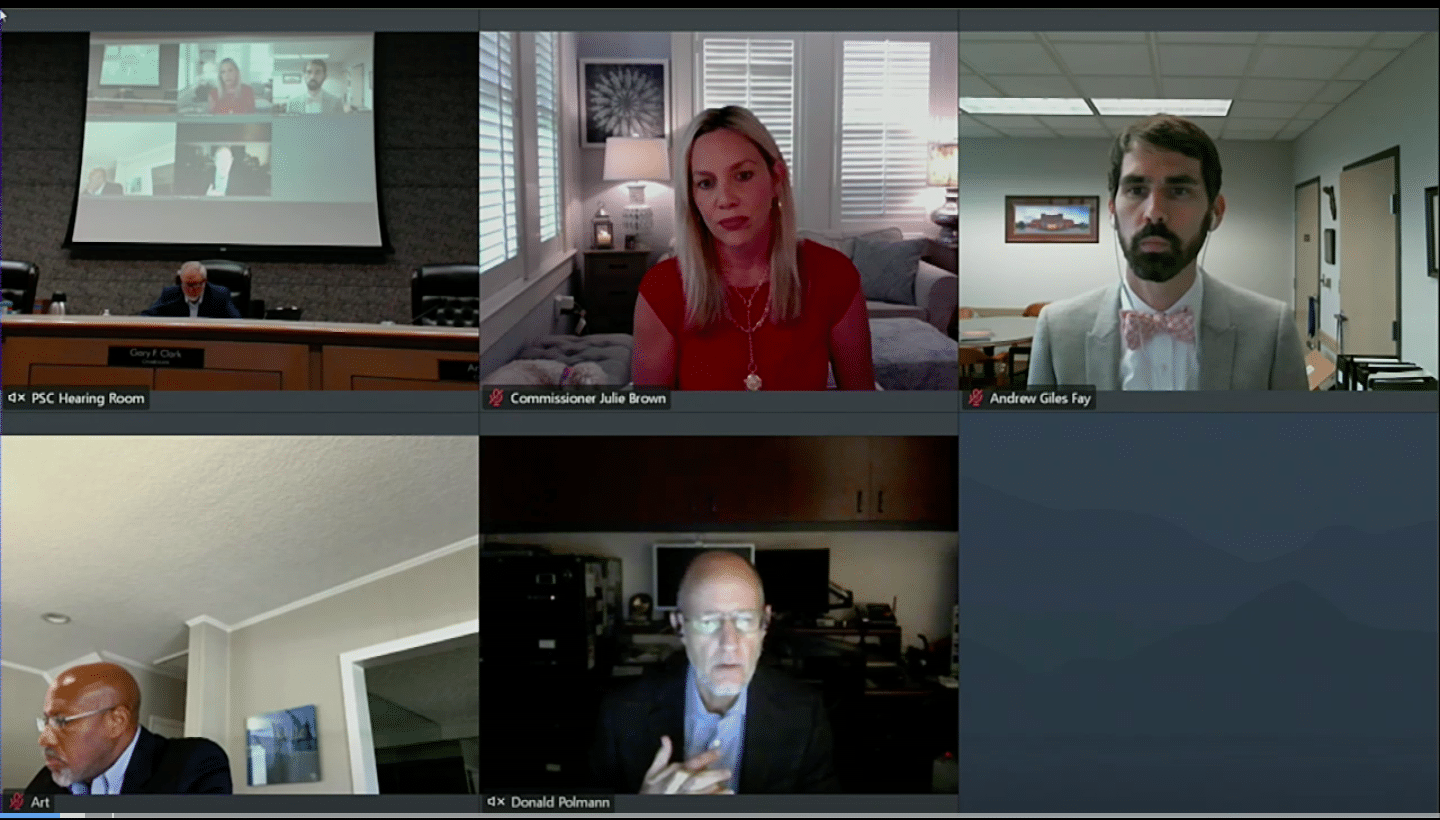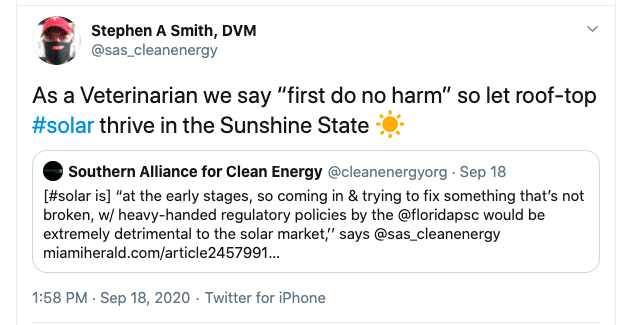A strong show of support for rooftop solar in Florida helps maintain the state's net metering rule. The Florida Public Service Commission decided not to act to change the rule at its September 17 workshop. But, we must continue to remain vigilant.
Bryan Jacob | September 22, 2020 | Energy Policy, Florida, SolarA very strong show of support for rooftop solar in Florida has helped to maintain the state’s net metering rule. The Florida Public Service Commission (PSC) decided not to act to change the rule at its September 17 workshop on Customer-Owned Renewable Generation. The workshop could have led to subsequent changes to the rule. Fortunately, the workshop ended with no move to change the Sunshine State’s cornerstone rule for solar development.
Thank you to the thousands of Floridians that filed comments with the PSC. Your voice made the difference. But, we must continue to remain vigilant.
SACE supports the robust development of all solar market sectors including utility-scale, shared solar programs, and rooftop solar. Why would the Sunshine State revisit its net metering rule when we have less than 1% of our energy met with rooftop solar?
If it ain’t broke don’t fix it
Last Thursday’s workshop was prompted by a letter sent to the PSC by freshman State Representative, Lawrence McClure. The letter referenced a report from a utility front group promoting misleading arguments about rooftop solar. In response, the PSC held a workshop to get a status update on the rule and potentially make a decision to revise it through a subsequent rulemaking. SACE alerted our members to this threat, encouraged comments into the PSC, hosted a webinar along with Floridians for Solar Choice, and published a blog that captured the sentiment on our net metering rule: “If It Ain’t Broke, Don’t Fix It.”

Because the Commission did not afford the public an opportunity to comment at the workshop but instead invited written comments, SACE also mobilized a campaign to submit letters directly to the Commission. And you really rose to that challenge! Very early in the workshop, Commissioner Julie Brown shared that the Commission had received more than 16,000 letters. Several thousand of those came from SACE members and for that, we thank you.
There’s no shortage of important challenges to address right now, among them: a global pandemic, the fight for racial equity, and an active hurricane season. SACE presented evidence that the penetration of net metering in Florida is low and that the most recent growth trend may naturally be impacted as the Federal investment tax credit phases-out and utility shared-solar programs compete for customer interest. Our main point was that the current net metering rule is working and “now’s not the time to fix something that’s not broken.”

SACE’s Executive Director, Dr. Stephen A. Smith, a retired veterinarian, shared a basic principle of medicine to “first do no harm” when considering any action. Opening the rule for a minor procedure could have risks (unintended consequences) associated with it. The slides Steve and I presented are available here.
Top Ten Takeaways
For those of you not able to watch the full workshop (three hours), I offer this Top Ten summary:
- Commissioner Julie Brown asserted her point of view that the current level of net metered solar in Florida is “really quite modest if you look at the data.”
- Commissioner Art Graham echoed the “deminimis” nature of solar at the present time and also postulated that when and if the Commission ever changes net metering in Florida, that existing net metering customers should be grandfathered to continue as-is.
- PSC Staff reaffirmed that net metering acts as a conservation measure and does not represent a “sale of electricity” – net metering is only a billing function.
- Office of Public Council cited the same Brookings Institution report “Rooftop solar: Net metering is a net benefit” that SACE referenced in our webinar and blog.
- Not surprisingly, representatives for FPL, Gulf Power, and Tampa Electric invoked typical utility buzzwords: cost-shift, subsidy, etc. in their shared comments.
- Duke Energy Florida commented on an agreement announced with stakeholders in South Carolina and North Carolina just the day prior (SACE is a party to that agreement).
- Katie Chiles Ottenweller, of Vote Solar, was the first speaker on behalf of the advocacy community and punctuated her points with a series of personal stories from rooftop solar customers in Florida.
- Our SACE presentation came next and, as indicated above, we showed that the penetration level suggests it would be premature to consider revising the state’s net metering, “Now’s not the time to fix something that’s not broken.”
- Justin Hoysradt, representing the Florida Solar Energy Industries Association (FlaSEIA) took exception to the utility representative’s exaggerated “subsidy” projection as “literally impossible” – the solar workforce in Florida couldn’t scale fast enough to make those a reality.
- The final presentation was from SunRun, the largest solar leasing company in the USA. In addition to expressing the stark reality of Covid-19 on the rooftop solar market (>5,600 jobs lost in Florida), Tyson Grinstead responded to additional interest from the Commission about the stakeholder agreement in the Carolinas.
This mobilization by customers and advocates underscores the very strong support for rooftop solar in Florida and its net metering rule. SACE continues to track net metering moves at the PSC and elsewhere and as always will keep you updated.